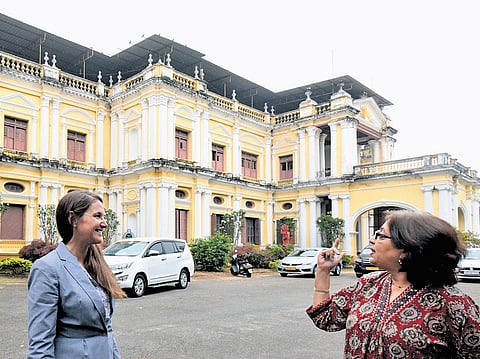

MYSURU : The restoration of the Jayalakshmi Vilas Mansion and folklore museum at the University of Mysore is on track with work in the west wing expected to be completed by the end of 2025.
Jeanne Briganti, Public Affairs Officer, US Consulate General, Chennai, along with Ratna Mukherjee, strategic planning and public engagement specialist of US Consulate General, Chennai, visited the treasured cultural heritage building to see the progress of restoration work taken up under the Ambassadors Fund for Cultural Preservation (AFCP) created by the US Department of State led by Deccan Heritage Foundation India (DHFI).
This project, funded through the US government’s AFCP, supports the conservation of the west wing of Jayalakshmi Vilas Mansion Folklore Museum building, and over 6,500 artifacts from across Karnataka.
The project, taken up by an AFCP grant of $3,00,000 for conservation and restoration, is yet another testament to the two nations’ friendship and respect for rich cultural heritage.
“Once completed, the Jayalakshmi Vilas Mansion and Folklore Museum will continue to delight future generations of Indians and international visitors,” said Jeanne Briganti.
Prof Nagaraj, UoM registrar (evaluation), said once completed, the restored Jayalakshmi Vilas Mansion Folklore Museum will not only add to the tourist attractions of Mysuru but will be a landmark destination and serve as a centre for research and higher learning for scholars focused on ethnographic traditions of Karnataka.
Located on the University of Mysore campus, Jayalakshmi Vilas Mansion was built in 1905 as a residence for Maharajkumari Jayalakshammani, eldest daughter of Mysore Maharaja Chamaraja Wadiyar X. The majestic building is designed in European classical style and has four wings.
The University of Mysore acquired the Jayalakshmi Vilas Mansion and its surrounding land in 1959 when KV Puttappa (popularly known as Kuvempu) was the vice-chancellor, to become a part of the sprawling Manasa Gangothri campus. The museum of folklore was set up by Dr Javare Gowda in 1969.
The AFCP is among the US government’s most significant cultural initiatives abroad. In the past 20 years, the United States has partnered with India to support 23 AFCP projects totalling over $2.7 million.
They include preservation of the famous Sunderwala Burj, Batashewala Mughal Tomb Complex, and the Arab Serai Complex Gateway within the UNESCO World Heritage site Humayun’s Tomb in New Delhi and many more.